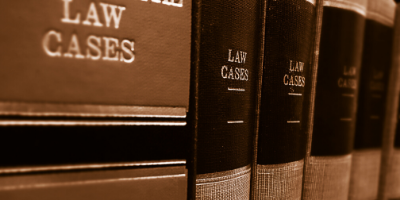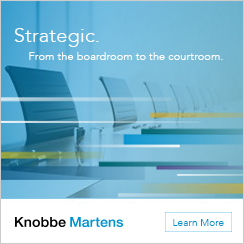Quarterly Journal 49-2
In This Section
The AIPLA Quarterly Journal, a publication of the American Intellectual Property Law Association, is housed at the George Washington University Law School and is edited and managed by an Editorial Board of intellectual property experts and a staff of law students under the direction of the Editor-in-Chief, Professor Joan Schaffner.
The Quarterly Journal is dedicated to presenting materials relating to intellectual property matters and is published four times per year. Editorial Board members (all of whom are lawyers) are selected based upon demonstrated interest and experience, and student staff members are selected from the students of the GWU Law School.
 QJ 49.2 - CAPTURING THE HEARTBEAT OF A CRISIS WITHOUT INFRINGEMENT
QJ 49.2 - CAPTURING THE HEARTBEAT OF A CRISIS WITHOUT INFRINGEMENT
Agnes Beatrice Gambill
CAPTURING THE HEARTBEAT OF A CRISIS WITHOUT INFRINGEMENT
Photographs capture the heartbeat of a crisis in ways that cannot be achieved through words alone. Thanks to social media platforms such as Instagram and Facebook, platform users are able to liberally share photographs through the technical process of embedding. In the digital age, social media sharing often occurs without the copyright owner's permission. So, then, where are all of the copyright infringement claims? In 2007, the Ninth Circuit in Perfect 10 held that embedding photos online does not infringe a copyright holder's display right, a legal theory that is widely known as the Server Test. This article reexamines the Server Test in light of a developing circuit split over its varied application in different jurisdictions. This article argues that, if certiorari is granted, the Supreme Court will reverse the Server Test, thereby creating possible copyright infringement liability for millions of social media users. This article also discusses the ramifications of a Server Test reversal and recommends practical solutions, such as modernization of the registration process, extensions for certain timing provisions, and a for-profit, standardized licensing mechanism for social media photo sharing. QJ 49.2 - RESPONSIBILITY FOR THE SALE OF TRADEMARK COUNTERFEITS ONLINE: STRIKING A BALANCE IN SECONDARY LIABILITY WHILE PROTECTING CONSUMERS
QJ 49.2 - RESPONSIBILITY FOR THE SALE OF TRADEMARK COUNTERFEITS ONLINE: STRIKING A BALANCE IN SECONDARY LIABILITY WHILE PROTECTING CONSUMERS
Kari Kammel, Jay Kennedy, Daniel Cermak, and Minelli Manoukian
RESPONSIBILITY FOR THE SALE OF TRADEMARK COUNTERFEITS ONLINE: STRIKING A BALANCE IN SECONDARY LIABILITY WHILE PROTECTING CONSUMERS
This paper provides a comprehensive analysis of the current state of the legal framework secondary trademark liability for the sale of counterfeit goods by third parties from a legal perspective and through the perspective of the opportunity or crime triangle used by social scientists. This issue continues to grow as technology rapidly expands and as e-commerce explodes and the current legal framework designed to protect consumers and trademark owners fails since it was crafted for a brick-and-mortar environment.
 QJ 49.2 - SEP ROYALTY RATE CALCULATION ON THE BASIS OF THE PRESENT VALUE ADDED (PVA): A MODEL AND ITS APPLICATION IN THE GERMAN LEGAL ORDER
QJ 49.2 - SEP ROYALTY RATE CALCULATION ON THE BASIS OF THE PRESENT VALUE ADDED (PVA): A MODEL AND ITS APPLICATION IN THE GERMAN LEGAL ORDER
Jan Schmitz and Fabian Hoffmann
SEP ROYALTY RATE CALCULATION ON THE BASIS OF THE PRESENT VALUE ADDED (PVA): A MODEL AND ITS APPLICATION IN THE GERMAN LEGAL ORDER
The most common method for standard essential patent (SEP) valuation and determining a fair, reasonable, and non-discriminative (FRAND) royalty rate is based on comparable license agreements. This method is relatively simple to apply but has several disadvantages. First, license agreements are often not comparable on important points. Second, they are often based on a selection by the submitting party, who has an interest in selecting only favorable license agreements for comparison. And third, those selected agreements might not have resulted from a fair negotiation, because of possible market power by either of the two sides.
In this Article, we therefore suggest how the present value added (PVA) methodology can be used to calculate the FRAND value of specific SEP technologies, avoiding biases that are intrinsically linked to the comparable licensing approach. The PVA approach can also serve as valuation methodology for the whole standard in the context of the Top-Down approach. To illustrate the approach, we present a simple interperiodical valuation model.
To derive a FRAND royalty rate, we then suggest how the PVA created can be apportioned between the SEP holders and the implementer. The second contribution of this Article is therefore the normative discussion of the apportionment of the PVA.
Finally, we show how the PVA methodology can be practically applied by running a hypothetical example of a full FRAND royalty estimation. The German legal framework has been chosen, since it is the European jurisdiction where an increasingly large number of legal disputes related to SEPs are adjudicated.
 QJ 49.2 - PARASITES OR BOOSTERS OF HUMAN CREATIVITY?: A MODEL TO SOLVE COPYRIGHT ISSUES OF TRAINING DATASETS OF ARTIFICIAL INTELLIGENCE BEFORE ALPHAART DEFEATS HUMAN ARTISTS
QJ 49.2 - PARASITES OR BOOSTERS OF HUMAN CREATIVITY?: A MODEL TO SOLVE COPYRIGHT ISSUES OF TRAINING DATASETS OF ARTIFICIAL INTELLIGENCE BEFORE ALPHAART DEFEATS HUMAN ARTISTS
Christina Han
PARASITES OR BOOSTERS OF HUMAN CREATIVITY?: A MODEL TO SOLVE COPYRIGHT ISSUES OF TRAINING DATASETS OF ARTIFICIAL INTELLIGENCE BEFORE ALPHAART DEFEATS HUMAN ARTISTS
Artificial intelligence (“AI”) is becoming more sophisticated and widespread, as it is considered the source of wealth for companies and governments across the world. This trend is also evident in the creative industry where AI has advanced to the point where it generates high quality musical and visual works that appeal to the masses. With such evolution of AI technology, there is a growing concern that AI may become a threat to human creators: if AI successfully produces more popular creative content than human creators do, AI may outcompete human creators in the job market and eventually undermine their incentive to create. In order for an AI system to generate creative content, however, it must be fed with similar or identical types of creative content that may be under copyright protection. This Note explains that such use without authorization may amount to copyright infringement, but currently it is difficult to enforce the rights of copyright holders due to the opacity of data used in training creative AI, that is, AI that produces creative works. This Note then examines the current legislative developments regarding the copyright issues of AI systems and discusses how the tensions between copyright owners and technology industry stakeholders have been alleviated. Finally, this Note calls for a model that increases data transparency and balances interests of both human creators and AI developers, and proposes the Good Data Model—which consists of (1) a data certification program, (2) a license scheme for collecting online content, and (3) a suspicious AI reporting system—as a solution that helps build a healthy ecosystem where creative AI and human creators co-exist peacefully and achieve super-creativity together.
 QJ 49.2 - A NEW INTERNATIONAL PATENT COURT: THE EXTRATERRITORIAL SOLUTION TO THE EXTRATERRITORIAL PROBLEM OF WESTERNGECO
QJ 49.2 - A NEW INTERNATIONAL PATENT COURT: THE EXTRATERRITORIAL SOLUTION TO THE EXTRATERRITORIAL PROBLEM OF WESTERNGECO
Eric Harmon
A NEW INTERNATIONAL PATENT COURT: THE EXTRATERRITORIAL SOLUTION TO THE EXTRATERRITORIAL PROBLEM OF WESTERNGECO
Patent law is territorial by nature, as each country decides for itself which inventions are patentable, and the scope of protections offered to them. Even so, attempts to harmonize patent laws on an international level have served to bring greater unity across a wide range of the laws from validity to priority dates. In light of this growing trend in our increasingly global marketplace, this Note recommends the creation of an international patent court, organized through the United Nations in order to achieve as broad of international coverage as possible. The jurisdictional scope of this court would be narrowly tailored, however, as a response to the decision of the Supreme Court of the United States in WesternGeco v. ION Geophysical, which allowed for the award of foreign damages resulting from domestic infringement. Skeptics of this decision have warned that it may prompt foreign nations to extend their patent protections so as to cover activities in the United States and elsewhere, thereby ignoring the traditional territorial borders of patent laws. This Note examines the relevant case law behind this issue, as well as existing international agreements representative of harmonizing efforts. The goal is to design a court capable of resolving these cross-border issues on an international basis should they arise, while keeping its objectives narrow enough to encourage compromise, cooperation, and participation among the world’s many different patent systems.
Upcoming Events
-
.png?sfvrsn=48c235e_1) 2026 Patent Prosecution Bootcamp - Arlington, VA
2026 Patent Prosecution Bootcamp - Arlington, VA
March 4 to 6, 2026 | Up to 1195 minutes, including 60 Ethics minutes
-
 AIPLA CLE Webinar: Damages 2025 Year-in-Review: Lessons and Litigation Strategies
AIPLA CLE Webinar: Damages 2025 Year-in-Review: Lessons and Litigation Strategies
March 11, 2026 2:00 PM to 3:30 PM | Eligible for up to 90 Mins CLE
-
.png?sfvrsn=20d96f46_1) AIPLA LinkedIn Live: What the 2025 AIPLA Economic Survey Reveals About IP Practice Today
AIPLA LinkedIn Live: What the 2025 AIPLA Economic Survey Reveals About IP Practice Today
March 12, 2026 12:00 PM to 12:45 PM
-
2026 Women in IP Global Networking Event
April 16, 2026
The annual Global Networking Event connects intellectual property practitioners from around the world for a day of networking, education, and creating meaningful connections. This year’s theme, Rooted in Real - Women in IP Redefining the Narrative, is an opportunity for the AIPLA Women in IP Law Committee to celebrate authentic experiences, foster genuine connections, and showcase the real stories of women shaping the field of intellectual property law. -
-(1).png?sfvrsn=169c8b82_1) Careers in IP
Careers in IP
April 22, 2026 12:30 PM to 1:30 PM | No CLE

